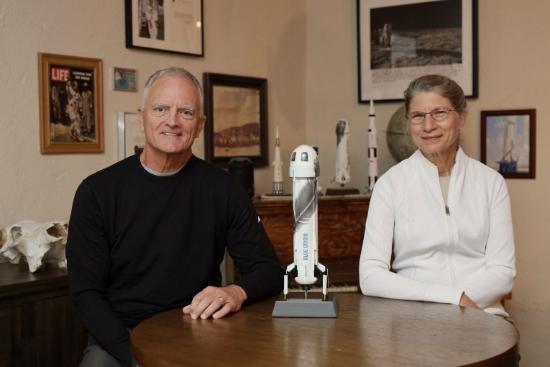Out of this world: UF Fall Commencement speakers announced
Space plant researchers Rob Ferl, Ph.D., and Anna-Lisa Paul, Ph.D., will be the speakers for the University of Florida’s Fall Commencement ceremonies Dec. 13 and 14.

Ferl is a distinguished professor, inaugural director of the Astraeus Space Institute, and assistant vice president for UF Research. Paul is a professor and director of UF’s Interdisciplinary Center for Biotechnology Research and a leading plant molecular biologist.
Ferl and Paul are pioneers in space plant science, best known for being the first to prove that plants could grow in lunar dust collected during the Apollo missions -- a groundbreaking achievement in space biology that was covered in news outlets around the world and lays the groundwork for humans to visit the moon for long periods.
In August, Ferl became the first NASA-funded academic researcher to conduct an experiment as part of a commercial space crew on a mission of Blue Origin’s New Shepard rocket.
“Rob Ferl and Anna-Lisa Paul are trailblazers in space plant science, and their research is helping shape the future of space exploration,” said Interim UF President Kent Fuchs. “Their groundbreaking work, paired with their passion for discovery, will undoubtedly inspire our graduates as they embark on their own journeys of exploration and innovation.”
Ferl and Paul often collaborate on projects that explore the effects of spaceflight on plants, including their gene expression.
Ferl co-chaired the steering committee for the Decadal Survey of Biological and Physical Sciences Research in Space for the National Academies of Sciences, Engineering and Medicine, which charts the course for the next 10 years of biological and physical sciences in space. He is also a past president of the American Society for Gravitational and Space Research.
Paul’s scientific endeavors have taken her to some of the most extreme environments on Earth, including the Arctic and Antarctica, where she uses these planetary analogs to study how plants respond to harsh conditions. In addition to her work with lunar dust, Paul, alongside Ferl, uses suborbital launch vehicles to explore how plants’ molecular processes are affected by the transition to space.
Paul’s contributions to science have earned her numerous accolades, including the NASA Medal of Honor for Exceptional Scientific Achievement. She is a Fellow of the American Association for the Advancement of Science and a Fellow of the American Society for Gravitational and Space Research as well as a member of the National Academies of Sciences, Engineering and Medicine’s Committee on Biological and Physical Sciences in Space.
